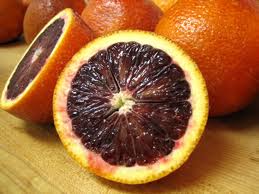Forwarded by Tim Underwood: the abstract of a study published in October 2012 in Life Sciences by Chidambara Murthy KN, et al, “D-limonene rich volatile oil from blood oranges inhibits angiogenesis, metastasis and cell death in human colon cancer cells.”
MAIN METHODS: Volatile oil was obtained from blood oranges by hydro-distillation. Nineteen compounds were identified by GC-MS and d-limonene was found to be the major component. The blood orange volatile oil was formulated into an emulsion (BVOE) and examined for its effects on viability of colon cancer cells. In addition, experiments were performed to understand the possible mechanism of proliferation inhibition, angiogenesis and metasasis by BVOE.
KEY FINDINGS: BVOE exhibited dose-dependent inhibition of cell proliferation and induced apoptosis in the colon cancer cells, as confirmed by flow cytometry. Immunoblotting of colon cancer cells treated with BVOE shows dose-dependent induction of Bax/Bcl2) and inhibition of vascular endothelial growth factor (VEGF). Furthermore, treatment of serum starved SW480 and HT-29 cells with 100μg/ml BVOE suggested the inhibition of VEGF and markers associated with inhibition of angiogenesis. The antiangiogenic activity of BVOE was also confirmed by inhibition of in vitro tube formation in human umbilical vein endothelial cells. Dose-dependent anti-metastasis activity and blockage of vascular endothelial growth factor receptor 1 (VEGFR1) binding following treatment with BVOE were confirmed by cell migration assays and immunoblots to detect decreased expression of matrix metalloproteinases (MMP-9).
SIGNIFICANCE: The results of this study provide persuasive evidence of the apoptotic and anti-angiogenesis potential of BVOE in colon cancer cells. The extent of induction of apoptosis and inhibition of angiogenesis suggest that BVOE may offer great potential for prevention of cancer and may be appropriate for further studies.
Copyright © 2012 Elsevier Inc. All rights reserved. PMID





